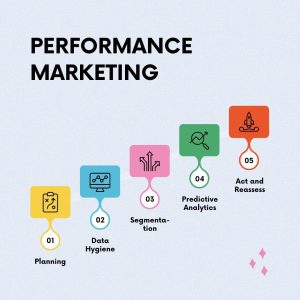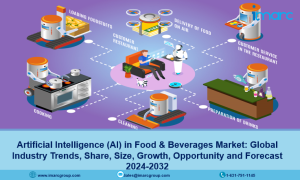Performance Marketing Services: Driving Results and Maximizing ROI
5 min readPerformance marketing has emerged as a powerful approach that focuses on driving specific actions and maximizing return on investment (ROI). Unlike traditional marketing methods that often rely on broad exposure and brand awareness, performance marketing is data-driven and results-oriented, ensuring that every marketing dollar spent contributes directly to the business’s bottom line. This article explores the various aspects of performance marketing services, their benefits, and how they can help businesses achieve their marketing goals.
What is Performance Marketing?
Performance marketing refers to a digital marketing strategy where advertisers pay for specific actions taken by users, such as clicks, leads, or sales. This model ensures that marketing efforts are directly tied to measurable outcomes, providing transparency and accountability for marketing expenditures. Key components of performance marketing include:
- Pay-Per-Click (PPC) Advertising: Advertisers pay a fee each time their ad is clicked, driving traffic to their website.
- Affiliate Marketing: Partners promote a business’s products or services and earn a commission for each sale or lead generated through their efforts.
- Social Media Advertising: Targeted ads on platforms like Facebook, Instagram, and LinkedIn designed to drive engagement and conversions.
- Email Marketing: Sending targeted email campaigns to nurture leads and drive conversions.
- Search Engine Optimization (SEO): Optimizing website content to improve organic search rankings and drive traffic.
- Content Marketing: Creating valuable content to attract and engage a specific audience, leading to profitable customer actions.
Benefits of Performance Marketing
Performance marketing offers numerous benefits for businesses, including:
- Measurable Results: Performance marketing is inherently data-driven, allowing businesses to track and measure the effectiveness of their campaigns in real-time. This enables marketers to make informed decisions and optimize their strategies for better results.
- Cost Efficiency: With performance marketing, businesses only pay for actual results, such as clicks, leads, or sales. This ensures that marketing budgets are spent effectively and efficiently, maximizing ROI.
- Targeted Approach: Performance marketing campaigns can be highly targeted, reaching specific audiences based on demographics, interests, and behaviors. This increases the likelihood of reaching potential customers who are more likely to convert.
- Flexibility and Scalability: Performance marketing campaigns can be easily adjusted and scaled based on performance and budget. This flexibility allows businesses to respond quickly to market changes and optimize their strategies for maximum impact.
- Enhanced Customer Insights: Performance marketing provides valuable data and insights into customer behavior, preferences, and purchasing patterns. This information can be used to refine marketing strategies and improve overall customer engagement.
Key Performance Marketing Services
1. Pay-Per-Click (PPC) Advertising
PPC advertising is one of the most popular and effective performance marketing strategies. It involves placing ads on search engines and other platforms, with advertisers paying a fee each time their ad is clicked. Key elements of PPC advertising include:
- Keyword Research: Identifying relevant keywords that potential customers are searching for.
- Ad Creation: Crafting compelling ad copy that encourages users to click.
- Bid Management: Setting and adjusting bids to ensure ads are displayed in the optimal positions.
- Campaign Optimization: Continuously monitoring and optimizing campaigns to improve performance and maximize ROI.
2. Affiliate Marketing
Affiliate marketing involves partnering with individuals or companies (affiliates) who promote a business’s products or services in exchange for a commission on each sale or lead generated. Key components of affiliate marketing include:
- Recruiting Affiliates: Identifying and recruiting affiliates who align with the business’s target audience.
- Providing Marketing Materials: Supplying affiliates with banners, links, and other promotional materials.
- Tracking and Reporting: Monitoring affiliate performance and tracking conversions to ensure accurate commission payments.
- Relationship Management: Building and maintaining strong relationships with affiliates to encourage ongoing promotion.
3. Social Media Advertising
Social media advertising leverages the vast user base and targeting capabilities of platforms like Facebook, Instagram, LinkedIn, and Twitter to reach potential customers. Key aspects of social media advertising include:
- Audience Targeting: Defining target audiences based on demographics, interests, and behaviors.
- Ad Formats: Utilizing various ad formats, such as image ads, video ads, carousel ads, and sponsored posts, to engage users.
- Campaign Management: Setting up and managing campaigns to ensure they align with business goals and drive desired actions.
- Performance Tracking: Monitoring key metrics, such as impressions, clicks, and conversions, to measure campaign effectiveness.
4. Email Marketing
Email marketing involves sending targeted email campaigns to a list of subscribers with the goal of nurturing leads and driving conversions. Key elements of email marketing include:
- List Building: Growing an email list of potential customers through sign-up forms, lead magnets, and other methods.
- Segmentation: Dividing the email list into segments based on demographics, interests, and behaviors to deliver personalized content.
- Email Design: Crafting visually appealing and engaging emails that encourage recipients to take action.
- Automation: Setting up automated email sequences to nurture leads and guide them through the sales funnel.
- Analytics: Tracking key metrics, such as open rates, click-through rates, and conversions, to measure campaign performance.
5. Search Engine Optimization (SEO)
SEO is the process of optimizing a website’s content and structure to improve its visibility in organic search results. Key components of SEO include:
- Keyword Research: Identifying relevant keywords that potential customers are searching for.
- On-Page Optimization: Optimizing website elements, such as title tags, meta descriptions, headers, and content, to improve search engine rankings.
- Technical SEO: Ensuring the website’s technical aspects, such as site speed, mobile-friendliness, and crawlability, support SEO efforts.
- Content Creation: Producing high-quality, relevant content that attracts and engages users.
- Link Building: Acquiring high-quality backlinks from reputable websites to improve domain authority and search engine rankings.
How Performance Marketing Services Drive Business Growth
Performance marketing services are designed to drive measurable results and maximize ROI, contributing to overall business growth. Here’s how these services can benefit businesses:
- Increased Traffic and Leads: Performance marketing campaigns drive targeted traffic to a business’s website, resulting in more leads and potential customers.
- Higher Conversion Rates: By targeting specific audiences and optimizing campaigns for desired actions, performance marketing can achieve higher conversion rates compared to traditional marketing methods.
- Improved Customer Engagement: Performance marketing strategies, such as social media advertising and content marketing, engage customers and build stronger relationships, leading to increased loyalty and repeat business.
- Data-Driven Decision Making: Performance marketing provides valuable data and insights that enable businesses to make informed decisions and continuously improve their marketing strategies.
- Scalable Growth: Performance marketing campaigns can be easily scaled based on performance and budget, allowing businesses to grow their marketing efforts in line with their objectives.
Conclusion
Performance marketing services offer businesses a powerful and cost-effective way to drive measurable results and maximize ROI. By leveraging data-driven strategies, such as PPC advertising, affiliate marketing, social media advertising, email marketing, and SEO, businesses can reach their target audience, increase conversions, and achieve sustained growth. In today’s competitive digital landscape, investing in performance marketing services is essential for businesses looking to thrive and stay ahead of the competition.






